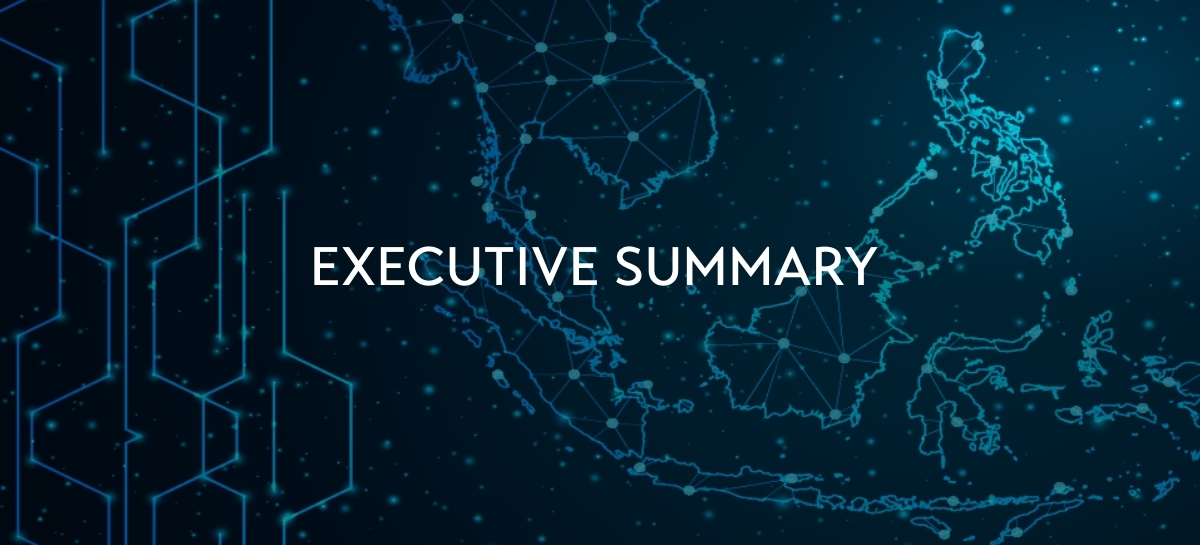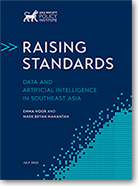Executive Summary
Southeast Asia has the opportunity to redefine inclusive development for the region by raising standards for data and ethical AI through multistakeholder approaches. If the current policy conversation does not evolve, the region risks ceding its voice to outsiders and reinforcing existing power structures that are unsuitable for the region’s long-term wellbeing.
We offer, for consideration, a policy playbook based on five principles: agency, care, equity, inclusion, and reliability. Our recommendations are driven by the realities of how people interact with technology; the understanding that context matters for these dynamics; and the belief that data-driven technologies should advance human dignity.
This publication is the culmination of a year-long research project on two major, interlinked pieces of the technological puzzle—data and artificial intelligence (AI)—in five Southeast Asian countries: Indonesia, Malaysia, Singapore, Thailand, and Viet Nam. Of importance to us was the extent to which data has contributed to inclusive development and ethics relating to AI in all five countries.
While data and AI are examined separately and in detail in 10 country chapters (five on data, five on AI), there are connecting threads throughout the narratives that are also reinforced in our policy playbook.
At the outset, the project sought to answer three primary questions related to data and AI:
What are the policy frameworks in place for the use and regulation of data in the five countries of focus? What do they mean for the development and adoption of AI technologies?
What has been the impact of data on the governance and economies of the five countries? What has been the impact of AI adoption on economic growth and societal changes there?
What challenges and opportunities exist for the five countries to contribute more actively—even proactively—to international standard-setting, rule-making, and norms-development forums on data and ethical AI?
Seven findings emerged in the course of our research:
1. On a mission with a vision
All five countries recognize the promise and potential of digital technologies to advance economic growth, improve public administration, and empower individual citizens. Both the public and private sectors share an exuberance and earnestness to integrate digitalization as widely as possible across the economic, governance, and social spheres. This drive is evidenced by the numerous national policies, strategies, and plans either in place or being developed to incorporate digital technologies and data in economies and societies, as well as the many public-private partnership initiatives to build capacity and infrastructure.
These efforts are supported by a latticework of data-related legal and regulatory instruments in various levels of development. Malaysia and Singapore have well-established data protection laws; Thailand’s came into effect on June 1, 2022; and Viet Nam’s and Indonesia’s draft legislation are being deliberated. Additionally, constitutional provisions, other laws, and sectoral rules govern the use of data in each of these countries.
All five countries have also plotted their AI journey over the next decade or more in official documents, although the trajectory for Malaysia and Thailand can be traced back to the 1990s. While the specific topic of ethics and AI is still nascent, with Singapore being the most forward-leaning of the pack, there is at least awareness across the region that the subject is an important one, even as countries grapple with its implementation at the national level.
2. Adoption and adaptation
Given variances in capacity and resources, countries have unsurprisingly implemented their policy and legal frameworks at different speeds and levels. In general, though, they have sought to keep pace with international technical and regulatory standards. The influence of the European Union’s (EU) General Data Protection Regulation (GDPR), in particular, is clearly reflected in informed debates on data protection legislation in all five countries. This is largely due to the expansive reach of the GDPR, itself, but it is also testament to how plugged in the Southeast Asian states are into the global (digital) economy, which is serviced by the constant hum of cross-border data flows. Even Indonesia and Viet Nam have narrowed their data localization requirements in response to trade and industry pressures as well as to meet treaty obligations, as is the case for Viet Nam with its ratification of the CPTPP.
With the introduction of the Global Cross-Border Privacy Rules Forum under the APEC Cross-Border Privacy Rules (CBPR), it remains to be seen how member countries like Singapore, as well as Indonesia and Malaysia—which have previously expressed interest in joining the APEC CBPR—can facilitate interoperable approaches to data protection alongside other regional and international frameworks on data flows.
There is also an interest in how data regimes elsewhere, such as in India and China, will continue evolving and whether Southeast Asian states can adapt the patchwork of available frameworks in these different jurisdictions to suit local—perhaps even regional—needs and interests. Similarly, during stakeholder consultations, informants raised the possibility of closer coordination on the subject of AI ethics with neighboring states in the Association of Southeast Asian Nations (ASEAN) region, moving forward. This aligns with a growing desire in the region to assert strategic autonomy and explore alternative approaches, while remaining engaged with the operating economic, political, and security architecture.
3. Socio-technical approach
Worldwide, there is a growing imperative to advance a holistic approach to AI that considers the computational, human, and systemic factors permeating its development, testing, deployment, and scaling. In Southeast Asia, there are gradual attempts to link compartmentalized conversations between technocrats and the larger public to cultivate deeper trust and confidence on data-driven technologies. This socio-technical approach helps reorient the focus on digitalization at the community level, and bridge local and global knowledge on technology. In practical terms, community-driven dialogues prompt engineers and developers to consider the real-world effects of their codes and algorithmic models. These exchanges also empower local communities with agency and ownership of data-driven or AI-enabled solutions, from their development through evaluation stages.
4. Missing perspectives
Despite the nominally comprehensive national policy frameworks on both data and AI in the five countries, there remain significant gaps in substance and approach.
One significant gap relates to the framing of national discussions on data and ethical AI. The approach has been decidedly conventional; borrowing concepts, structures, and terms from abroad and localizing them where relevant. While convenient, especially given the pace of changes in data governance and AI uses worldwide, it fundamentally reduces Southeast Asian countries to derivatives of developments elsewhere despite divergent demographics, histories, and social realities. Importing—copying and pasting—concepts and phrases such as “privacy,” “personal,” “explainability,” and “transparency” into the local milieu does not always translate well or at all, notionally or linguistically. For example, concepts like privacy in close-knit communities can sometimes only be translated into awkward approximations because the individualistic interpretation of the word can seem alien.
Relatedly, although digital inclusion campaigns attempt to take into account women, children, the elderly, and even the differently abled (albeit inadequately), they often discount indigenous and other marginalized communities along with their distinct perspectives of relating to the world. These campaigns also overlook or dismiss their level of willingness to even participate in a data-driven landscape in the first place. There is little to no discussion of this apart from within civil society networks.
5. Back to basics
Because discussions on digitalization have been so skewed toward the economic and development agenda, the goal to establish a prosperous, digital society seems uncontested, especially if there are apparent guardrails in place like data protection, AI ethics, and the UN’s sustainable development goals (SDGs). However, without closer scrutiny of these safeguards, there arises the risk of a false sense of security or morality. There is little public debate about whose ethics are even being considered for application, whether conceptions of community data should be considered alongside individual data, or what impact assessments are being required to adhere to SDGs.
Government and non-government stakeholders will need to ask some fundamental questions related to the existing frameworks of data and AI ethics: What is the ultimate purpose that data-driven technologies serve? If, on the one hand, data-driven technologies are meant to be purely functional, do prevailing frameworks suffice? If, on the other hand, technology is meant to restore and empower human dignity, then do current frameworks support this objective? If not, what more needs to be done?
These questions may border on the abstract and philosophical but they form a critical basis upon which to develop an ethical framework for data and AI that goes beyond just augmenting the digital economy. An inclusive take on data and an ethical framing of AI can only resonate meaningfully if it is understood, and invested in, by the society it is meant to serve.
6. Expand multistakeholderism
Contributing a distinctly national or regional approach to inclusive data and ethical AI that accords with prevailing international standards presupposes the possession of a self-assured national or regional identity in the first place. Establishing that approach requires an awareness and embrace of contextual values, principles, even traditions.
In practical terms, it should widen multistakeholder participation beyond the “usual suspects” of policymakers, industry players, engineers, scientists, and lawyers. A rounded approach should also draw historians, linguists, social scientists, and creative artists, among others, to the table. Understanding the impact of technology on a nation throughout history is pertinent in light of warnings of data colonialism and surveillance capitalism. Learning the etymology of words can help translate a term like “algorithmic justice” for effective resonance in local languages, dialects, and colloquialism.
7. Inter-regional observations
Finally, exchanging lessons on innovative uses of data rooted in cultural practices with other developing regions and communities in Africa and Latin America can help enrich Southeast Asia’s own framing of unfolding conversations on data and ethical AI. For example, embedding data as patterns in traditional fabrics to communicate a message against gender-based violence has been trialed in Tanzania.
Democratizing the responsible use of data, ensuring that data represents some of the most marginalized members of society, and enabling open data to reach millions who live without easy access to mobile internet can contribute to the ultimate objective of digital technologies: augmenting human dignity.
This publication is a snapshot in time of developments and trends in five specific countries but with longer-term implications for the governance of technology in the region. It also calls into question Southeast Asia’s role in shaping the rules of the road at the international level as the region positions itself to be a thriving, networked hub for a digitalized future.


